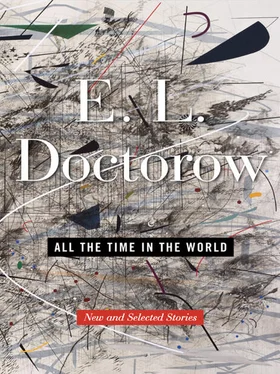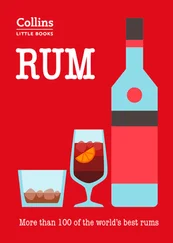Years ago his life had fallen into a pattern of business failures and missed opportunities. The great debate between his family on the one side, and my mother Ruth on the other, was this: who was responsible for the fact that he had not lived up to anyone’s expectations?
As to the prophecies, when spring came my mother’s prevailed. Grandma was still alive.
One balmy Sunday my mother and brother and I took the bus to the Beth El cemetery in New Jersey to visit my father’s grave. It was situated on a slight rise. We stood looking over rolling fields embedded with monuments. Here and there processions of black cars wound their way through the lanes, or clusters of people stood at open graves. My father’s grave was planted with tiny shoots of evergreen but it lacked a headstone. We had chosen one and paid for it and then the stonecutters had gone on strike. Without a headstone my father did not seem to be honorably dead. He didn’t seem to me properly buried.
My mother gazed at the plot beside his, reserved for her coffin. “They were always too fine for other people,” she said. “Even in the old days on Stanton Street. They put on airs. Nobody was ever good enough for them. Finally Jack himself was not good enough for them. Except to get them things wholesale. Then he was good enough for them.”
“Mom, please,” my brother said.
“If I had known. Before I ever met him he was tied to his mama’s apron strings. And Essie’s apron strings were like chains, let me tell you. We had to live where we could be near them for the Sunday visits. Every Sunday, that was my life, a visit to Mamaleh. Whatever she knew I wanted, a better apartment, a stick of furniture, a summer camp for the boys, she spoke against it. You know your father, every decision had to be considered and reconsidered. And nothing changed. Nothing ever changed.”
She began to cry. We sat her down on a nearby bench. My brother walked off and read the names on stones. I looked at my mother, who was crying, and I went off after my brother.
“Mom’s still crying,” I said. “Shouldn’t we do something?”
“It’s all right,” he said. “It’s what she came here for.”
“Yes,” I said, and then a sob escaped from my throat. “But I feel like crying too.”
My brother Harold put his arm around me. “Look at this old black stone here,” he said. “The way it’s carved. You can see the changing fashion in monuments — just like everything else.”
SOMEWHERE IN THIS TIME I began dreaming of my father. Not the robust father of my childhood, the handsome man with healthy pink skin and brown eyes and a mustache and the thinning hair parted in the middle. My dead father. We were taking him home from the hospital. It was understood that he had come back from death. This was amazing and joyous. On the other hand, he was terribly mysteriously damaged, or, more accurately, spoiled and unclean. He was very yellowed and debilitated by his death, and there were no guarantees that he wouldn’t soon die again. He seemed aware of this and his entire personality was changed. He was angry and impatient with all of us. We were trying to help him in some way, struggling to get him home, but something prevented us, something we had to fix, a tattered suitcase that had sprung open, some mechanical thing: he had a car but it wouldn’t start; or the car was made of wood; or his clothes, which had become too large for him, had caught in the door. In one version he was all bandaged and as we tried to lift him from his wheelchair into a taxi the bandage began to unroll and catch in the spokes of the wheelchair. This seemed to be some unreasonableness on his part. My mother looked on sadly and tried to get him to cooperate.
That was the dream. I shared it with no one. Once when I woke, crying out, my brother turned on the light. He wanted to know what I’d been dreaming but I pretended I didn’t remember. The dream made me feel guilty. I felt guilty in the dream too because my enraged father knew we didn’t want to live with him. The dream represented us taking him home, or trying to, but it was nevertheless understood by all of us that he was to live alone. He was this derelict back from death, but what we were doing was taking him to some place where he would live by himself without help from anyone until he died again.
At one point I became so fearful of this dream that I tried not to go to sleep. I tried to think of good things about my father and to remember him before his illness. He used to call me “matey.” “Hello, matey,” he would say when he came home from work. He always wanted us to go someplace — to the store, to the park, to a ball game. He loved to walk. When I went walking with him he would say: “Hold your shoulders back, don’t slump. Hold your head up and look at the world. Walk as if you meant it!” As he strode down the street his shoulders moved from side to side, as if he was hearing some kind of cakewalk. He moved with a bounce. He was always eager to see what was around the corner.
THE NEXT REQUEST for a letter coincided with a special occasion in the house: my brother Harold had met a girl he liked and had gone out with her several times. Now she was coming to our house for dinner.
We had prepared for this for days, cleaning everything in sight, giving the house a going-over, washing the dust of disuse from the glasses and good dishes. My mother came home early from work to get the dinner going. We opened the gateleg table in the living room and brought in the kitchen chairs. My mother spread the table with a laundered white cloth and put out her silver. It was the first family occasion since my father’s illness.
I liked my brother’s girlfriend a lot. She was a thin girl with very straight hair and she had a terrific smile. Her presence seemed to excite the air. It was amazing to have a living breathing girl in our house. She looked around and what she said was: “Oh, I’ve never seen so many books!” While she and my brother sat at the table my mother was in the kitchen putting the food into serving bowls and I was going from the kitchen to the living room, kidding around like a waiter, with a white cloth over my arm and a high style of service, placing the serving dish of green beans on the table with a flourish. In the kitchen my mother’s eyes were sparkling. She looked at me and nodded and mimed the words: “She’s adorable!”
My brother suffered himself to be waited on. He was wary of what we might say. He kept glancing at the girl — her name was Susan — to see if we met with her approval. She worked in an insurance office and was taking courses in accounting at City College. Harold was under a terrible strain but he was excited and happy too. He had bought a bottle of Concord-grape wine to go with the roast chicken. He held up his glass and proposed a toast. My mother said: “To good health and happiness,” and we all drank, even I. At that moment the phone rang and I went into the bedroom to get it.
“Jonathan? This is your aunt Frances. How is everyone?”
“Fine, thank you.”
“I want to ask one last favor of you. I need a letter from Jack. Your grandma’s very ill. Do you think you can?”
“Who is it?” my mother called from the living room.
“Okay, Aunt Frances,” I said quickly. “I have to go now, we’re eating dinner.” And I hung up the phone.
“It was my friend Louie,” I said, sitting back down. “He didn’t know the math pages to review.”
The dinner was very fine. Harold and Susan washed the dishes and by the time they were done my mother and I had folded up the gateleg table and put it back against the wall and I had swept the crumbs up with the carpet sweeper. We all sat and talked and listened to records for a while and then my brother took Susan home. The evening had gone very well.
Читать дальше












